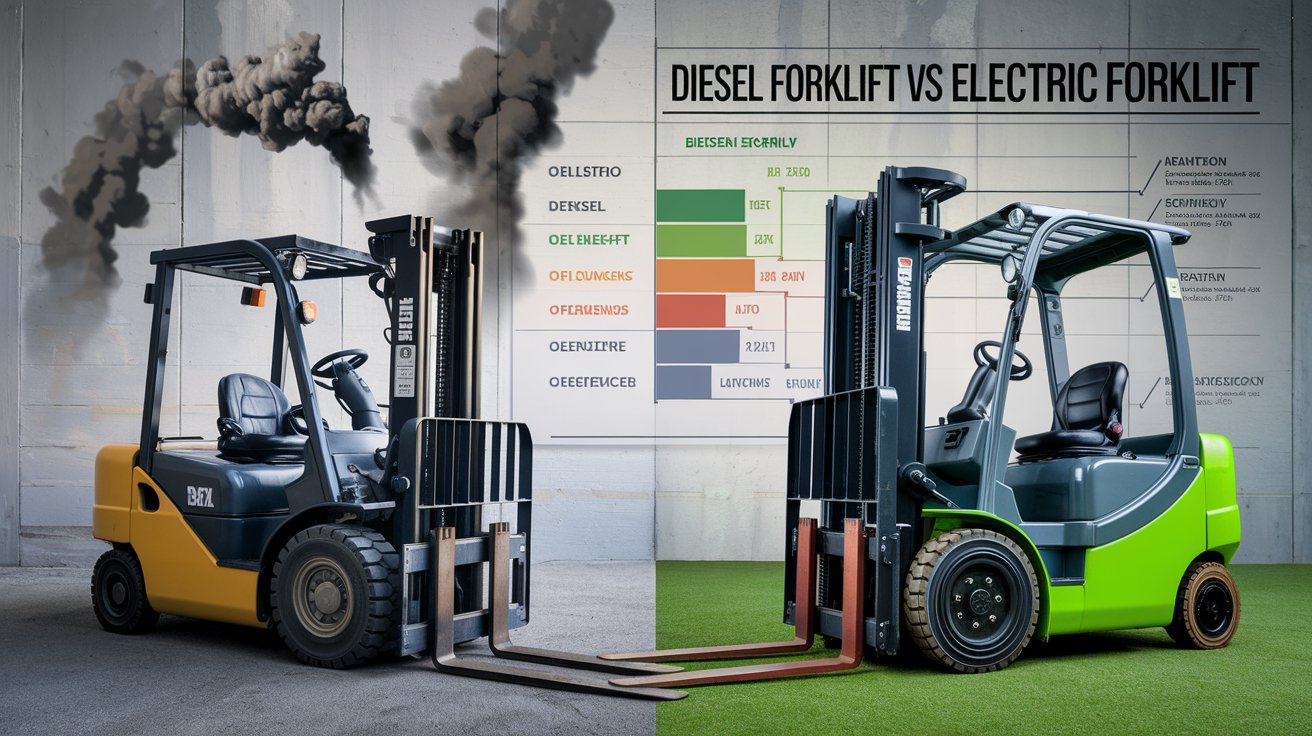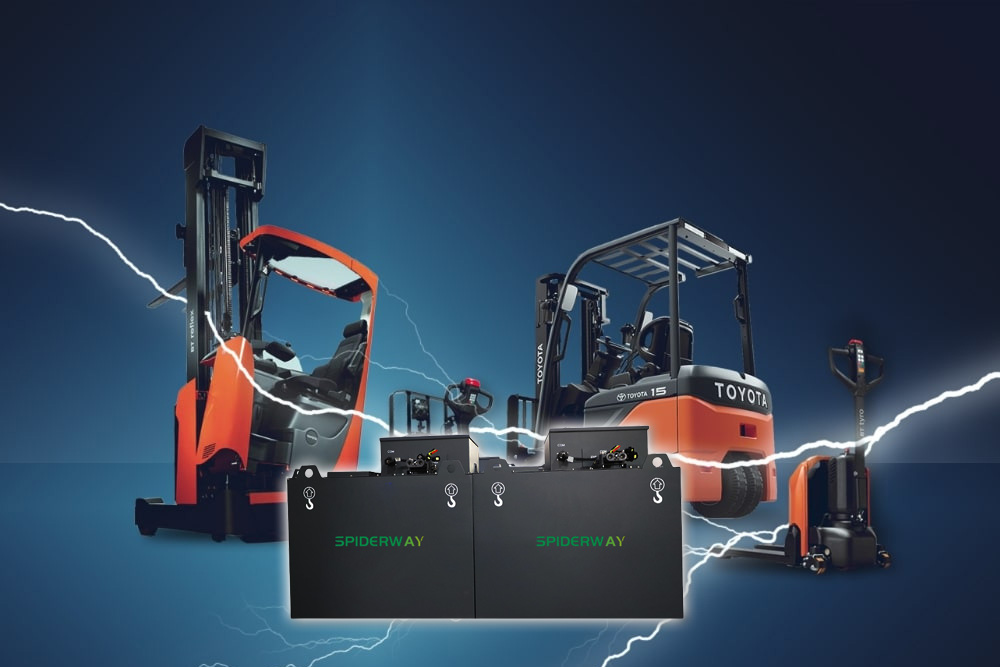
In recent years, the material handling industry has been witnessing a major shift from traditional fuel-powered forklifts (diesel) to more environmentally friendly and cost-efficient electric forklifts, especially those powered by LFP lithium batteries. As businesses strive to improve operational efficiency, reduce costs, and meet sustainability goals, it is essential to compare the advantages and disadvantages of diesel vs. lithium battery-powered forklifts. This article provides an in-depth comparison of fuel (diesel) forklifts vs. electric forklifts (LFP lithium battery) based on key factors like purchase cost, operating costs, efficiency, comfort, and environmental impact. It also analyzes the feasibility and necessity of converting diesel forklifts to lithium battery-powered ones, and highlights the advantages of the SPIDERWAY solution.

1. Price Comparison: Diesel Forklifts vs. Electric Forklifts
| Feature | Diesel Forklift | Electric Forklift (LFP Lithium) |
|---|---|---|
| Initial Purchase Cost | Lower upfront cost (≈ 10-20% cheaper) | Higher upfront cost due to battery and electric components |
| Battery Replacement Cost | N/A (Fuel cost ongoing) | Battery replacement required after ~3-5 years |
| Maintenance Costs | Higher due to engine, fuel systems, and emissions maintenance | Lower (fewer moving parts, no engine or fuel system) |
Diesel forklifts generally have a lower initial purchase price when compared to their electric counterparts, especially LFP lithium battery-powered forklifts. However, electric forklifts often offer lower overall operating costs due to reduced maintenance needs and fewer fuel-related expenses.
2. Operating Costs: Fuel vs. Electricity
| Feature | Diesel Forklift | Electric Forklift (LFP Lithium) |
|---|---|---|
| Fuel Costs | High – Diesel prices fluctuate with market changes | Lower – Electricity is more stable and cheaper |
| Charging/Fueling Time | Longer refueling times | Fast charging (1-2 hours for LFP batteries) |
| Operating Hours | Typically longer continuous usage | Limited by battery charge, but can be extended with additional batteries or fast charging |
The operating cost of diesel forklifts is heavily dependent on fluctuating fuel prices, while electric forklifts benefit from more stable electricity prices. LFP lithium battery-powered forklifts have shorter refueling times and can be charged quickly, making them more efficient in high-demand environments.
3. Work Efficiency
| Feature | Diesel Forklift | Electric Forklift (LFP Lithium) |
|---|---|---|
| Lifting Capacity | Higher due to engine power | Adequate for most applications, but lower than diesel |
| Operation Range | Longer range with fuel tank | Limited by battery life (can be managed with quick swaps or additional batteries) |
| Fuel Efficiency | Lower (due to engine inefficiencies) | Higher (electric motors are more efficient) |
Diesel forklifts tend to have greater lifting capacity and range due to the power of their engines and larger fuel tanks. However, electric forklifts are more efficient, offering better energy consumption per unit of work.
4. Comfort and Operator Experience
| Feature | Diesel Forklift | Electric Forklift (LFP Lithium) |
|---|---|---|
| Noise Level | High noise levels due to engine | Very quiet operation |
| Vibration | Higher vibrations due to combustion engine | Minimal vibrations, smoother ride |
| Exhaust | Emits fumes and pollutants | Zero emissions, cleaner environment |
Electric forklifts are significantly more comfortable for operators, offering a quieter, smoother ride with fewer vibrations. Diesel forklifts, on the other hand, are noisy and produce exhaust fumes, which can lead to operator fatigue and a less pleasant working environment.
5. Environmental Impact
| Feature | Diesel Forklift | Electric Forklift (LFP Lithium) |
|---|---|---|
| Carbon Emissions | High (due to diesel combustion) | Zero emissions (if powered by renewable energy) |
| Noise Pollution | High | Very low |
| Battery Recycling | N/A | LFP lithium batteries are recyclable |
Electric forklifts are much more environmentally friendly, emitting zero carbon during operation and contributing less to noise pollution. Diesel forklifts, while still prevalent, have a significant environmental footprint due to their fuel consumption and emissions.
6. Conversion: Diesel Forklifts to Lithium Battery Forklifts
As the market demands more sustainable solutions, many companies are exploring the possibility of converting their existing diesel forklifts to electric-powered ones using lithium battery systems. This conversion offers several advantages:
- Cost Savings: Although the conversion involves an initial investment in new batteries and electric components, it leads to long-term savings through lower fuel and maintenance costs.
- Environmental Benefits: Switching to electric power significantly reduces the carbon footprint of a company’s operations, aligning with global sustainability goals.
- Improved Efficiency: Converting to lithium battery power enhances energy efficiency, reduces downtime, and improves the overall productivity of the forklift fleet.
However, conversion may not be suitable for all applications. It requires proper evaluation of the forklift’s age, usage pattern, and necessary modifications. For many businesses, investing in a new lithium-powered forklift directly might be a more viable option.

SPIDERWAY Upgrade Solutions & Product Advantages
SPIDERWAY offers a seamless and cost-effective solution for upgrading your diesel forklifts to LFP lithium battery-powered forklifts. With SPIDERWAY’s advanced lithium battery technology, companies can experience:
- Higher Energy Efficiency: LFP batteries offer better performance over longer periods with less energy loss.
- Faster Charging: Unlike traditional lead-acid batteries, LFP batteries charge faster, allowing your forklift fleet to spend more time working.
- Extended Lifespan: SPIDERWAY’s LFP lithium batteries last significantly longer than lead-acid alternatives and require fewer replacements over time.
- Zero Emissions: Transitioning to electric forklifts powered by LFP lithium batteries can help your company reduce its environmental impact and meet sustainability targets.
Conclusion: Diesel Forklifts vs. Electric Forklifts (LFP Lithium Batteries)
The choice between diesel forklifts and electric forklifts powered by LFP lithium batteries depends on various factors such as cost, operational efficiency, and environmental considerations. Diesel forklifts may still be suitable for certain heavy-duty applications with extensive range requirements. However, electric forklifts powered by LFP lithium batteries are increasingly becoming the preferred choice due to their low operating costs, environmental benefits, and overall efficiency.
For businesses looking to reduce their environmental footprint and operating expenses, upgrading diesel forklifts to LFP battery-powered forklifts is a viable and necessary solution. SPIDERWAY offers advanced battery technology that makes this transition smoother, more cost-effective, and sustainable.
Content Keywords:
- Diesel Forklift vs Electric Forklift
- Diesel Forklift vs Lithium Battery Forklift
- Diesel Forklift Conversion to Lithium Forklift
By choosing SPIDERWAY, businesses can ensure they are ahead of the curve in terms of technology, cost-efficiency, and sustainability.
https://www.spider-way.com/fuel-diesel-forklifts-vs-electric-lfp-lithium-battery-forklifts-a-comprehensive-comparison/?_unique_id=67e573b415257
Comments
Post a Comment